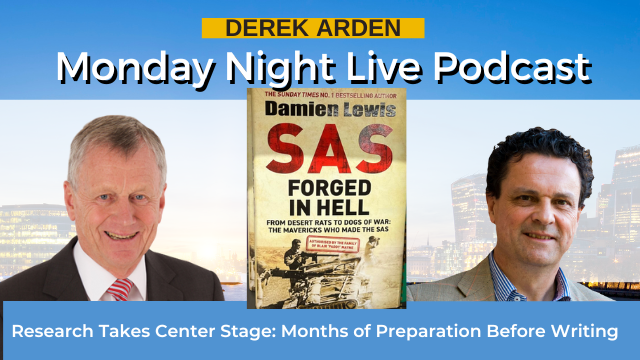Podcast: Play in new window | Download (Duration: 46:27 — 42.5MB) | Embed
Derek Arden
In this week’s Monday Night Live Podcast, Derek Arden talks to the incredible author about his new book.
The interviewer Derek praised Damien’s storytelling style of moving from one chapter to another, sometimes going back and forth, which keeps readers interested.
Damien explained that his writing style is a result of extensive research and planning. He creates a detailed plan with a chronology of events and sources for each event. This plan helps him maintain the flow of the narrative and quickly access the necessary sources while writing.
He mentioned that the research process, including gathering sources and creating the research document, takes far longer than actually writing the book. It can take months and months of work to put the research together.
When asked about the time it took to write “SAS – Forged in Hell,” Damien mentioned that it took about three months to write, but the research for the book took several years.
Damien shared personal experiences from his book events where he met family members of veterans and how they found his book emotionally powerful and transformative. He emphasized the importance of personal testimonies in his research.
He mentioned the grandson of one of the SAS veterans thanking him for writing the book and for unlocking memories and stories that his father had never shared before.
Damien also talked about his friendship with Alec Bora, one of the last surviving SAS veterans from World War Two, and how he interviewed Alec before his passing. He highlighted the deep bond and respect that SAS soldiers had for their commanding officers.
The interview touched on the concept of “transformational command” in the SAS, where leaders inspire their men through their example and forge strong bonds. This style of leadership is about earning respect rather than simply relying on rank.
Damien explained that transformational command is recognized in the military and also in business and industry, and the SAS often lectures on it to businesses.
The conversation mentioned neurodiversity and how the SAS valued individuals who could think outside the box and act unexpectedly, especially during World War Two.
Damien briefly discussed the Ministry of Ungentlemanly Warfare, which was the Special Operations Executive (SOE) during World War Two, and their unconventional methods of warfare.
There was a mention of Hitler’s directive to kill captured Allied agents and Special Forces operators during the war, even if they were in uniform, which was a war crime.
Damien also talked about the assassination of Reinhard Heydrich in Prague by SOE agents and the severe reprisals that followed, including the destruction of the village they came from.
The interview concluded with a question about how Damien chooses his book titles. He explained that titles often emerge from the writing process and may be related to key quotes or themes within the book.
A question about how he decides where to start and finish a book in his extensive research was also asked, and Damien mentioned that it’s an instinctive process that comes out of writing and selecting the most relevant characters and operations to include in the narrative.
Crafting a Gripping Narrative: Damien Lewis’ Unique Writing Style
The Importance of Meticulous Research and Planning
Research Takes Center Stage: Months of Preparation Before Writing
The Emotional Impact of Personal Testimonies in Writing
Unveiling Hidden Stories: How Research Transforms Lives
Transformational Command: Leadership in the SAS
Neurodiversity and Thinking Outside the Box in Special Forces
Ministry of Ungentlemanly Warfare: Unconventional Warfare in WWII
Hitler’s Directive to Kill Captured Allied Agents: A War Crime
Choosing Titles and the Art of Selecting Material for a Gripping Narrative
- https://derekarden.co.uk
- https://negotiationexpert.co NEW
- https://negotiatorspodcast.com
- https://www.linkedin.com/in/negotiatingexpert/

